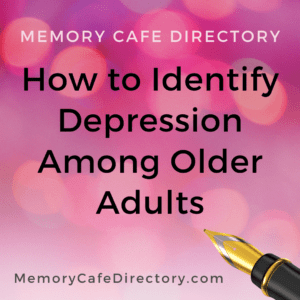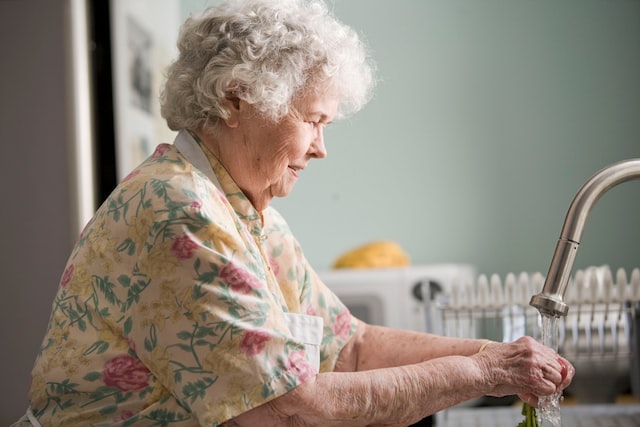Memory Cafe Directory posts and/or links to retailers can be advertising, sponsored, or affiliate links. We may earn a small commission from them. Thank you.
Identifying depression among older adults may not be as simple as people often assume. While some symptoms, such as visible sadness or loneliness, may be noticeable to others, depression can also manifest in more subtle ways, such as irritability, loss of interest, fatigue, and other complex factors that may not be directly obvious.
Therefore, it is crucial to recognize that depression can manifest in various forms and may not always be easy to spot, especially in elderly people. This can be especially difficult in the dementia community.
In this article, we’ll discuss the different signs of depression in older adults, common causes, and other related factors to consider. This intends to help our seniors and the people around them to have a better grasp and recognize when treatment may be necessary.
How Does Depression Differ in Older Adults?
Depression can affect individuals of all ages, but it generally manifests differently for both parties. Like depression may have a slightly different effect for males and females, age also poses distinctions.
According to a 1994 study, younger individuals are more likely to exhibit cognitive-affect symptoms of depression, while older adults’ depression often manifests as somatic symptoms.
This means that when depressed, older adults often experience physical manifestations such as pain, fatigue, and sleep disorder, as opposed to younger people who may share more emotional symptoms of sadness and loneliness.
Nevertheless, it’s crucial to keep in mind that depression can manifest differently for each individual, regardless of age, gender, or other classifications. This emphasizes the need for personalized treatments, whether through online therapy sessions, in-person therapies, or other evidence-based treatments tailored to their distinct needs.
What Causes Depression for Older Adults?
There are several factors that can contribute to the risk of depression for older adults, and understanding them can help in effective prevention. Here are the most common reasons:
Impaired Health Condition
As people age, many health conditions start to pile up, such as heart disease, diabetes, and other chronic illnesses that may directly impact their quality of life and overall well-being. Poor physical health is also a significant factor that can increase the risk of depression along with mobility issues for older adults.
Maintaining a healthy diet and following a regular exercise regimen can help reduce these risks and improve overall health.
Cognitive Decline or Dementia
Coping with cognitive decline can be a difficult experience for the elderly, causing frustration and significantly impacting their emotions. This can result in feelings of loneliness and depression, making it even more difficult to manage their cognitive health.
Engaging in physically and mentally stimulating activities regularly are excellent practices for reducing the risk of cognitive decline for older adults. Memory Cafes can be an excellent source of dementia-friendly activities.
A wonderful recall activity you can do at home is Memory Joggers. Recite a familiar phrase, and ask your loved one to give you the final word. Each time we recall a memory, it strengthens the connection to it.
Loneliness and Social Isolation
Social isolation and feelings of loneliness can profoundly impact an individual’s mental well-being, especially for older adults. When seniors lack regular social interactions and meaningful connections with other people, they are more likely to experience negative emotions, including sadness, anxiety, and depression.
There is no better remedy for older adults’ overall health and mental well-being than having a sense of community. Fostering social connections and meaningful relationships with others allows them to experience a range of positive benefits, improving their mood and preserving cognitive function.
Grief and Loss of a Loved One
Losing a loved one can also be really tough, especially for older people’s overall health and well-being. Aside from loneliness, it can also impact their daily routines, making them feel like they’ve lost their sense of purpose and meaning.
During times of hardship, providing emotional support to older people is crucial. By simply listening to them and offering comfort as they grieve, we can help them through difficult times. Grief and loss can be challenging to overcome, but there are ways to make them more manageable.
Encouraging them to stay connected with others, whether it’s through friends, family, or their community, can help ease the sense of loneliness and isolation that often accompanies these difficult emotions.
Signs of Depression in the Elderly
As mentioned earlier, depression can manifest in different forms and can be harder to recognize when it comes to the elderly.
Still, there are ways and signs that can help us pinpoint whether our loved ones are potentially experiencing symptoms of depression, helping us mitigate the issue before it causes further impact on their health and overall well-being.
Experiencing a Sense of Worthlessness
This feeling makes older adults question their value and importance, which causes negative thoughts about themselves that can easily lead to depression.
Struggling to Sleep
Older people who are suffering from depression tend to have a hard time sleeping as well, leading to further anxiety and mood disorders.
Finding it Hard to Concentrate
Having trouble following conversations and completing simple tasks can also signify an older adult suffering from depression.
Feeling Low on Energy and Experiencing Fatigue
Even a simple task of getting out of bed can be challenging for an elderly that is suffering from depression as they are constantly low on energy levels and continuously fatigued.
Losing interest in previously enjoyable activities: Loss of interest is another sign of depression for older adults. This feeling makes them disinterested even in activities they used to enjoy.
Experiencing a Significant Decrease in Appetite
Depression in older adults can also cause a lack of interest in food, raising concerns about maintaining a healthy diet. Failure to control their loss of appetite can quickly become a significant concern for their overall health.
Final Thoughts
Depression is never easy for anyone, let alone for older people. The good news is there are ways to prevent and cure them when spotted. With a better understanding of identifying depression among older adults, people around them can seek immediate help when deemed necessary.






